GSM Academic Skills Portfolio: Brexit, Globalisation & Labour
VerifiedAdded on 2023/06/10
|13
|3989
|117
Portfolio
AI Summary
This Academic Skills Portfolio (ACSK4001) assesses academic skills through various tasks focusing on the impact of the 2016 Brexit referendum. The portfolio includes evaluating sources, presenting and analyzing data, and delivering a presentation. Specific areas explored are the impact of Brexit on globalization, and labour supply. The portfolio contains reflections on presentation skills, critical engagement with texts, and an academic report analyzing the possible impacts of the referendum result on the UK. It demonstrates an understanding of academic literacy, critical thinking, and self-reflection, as well as the ability to use appropriate technologies for self-analysis.
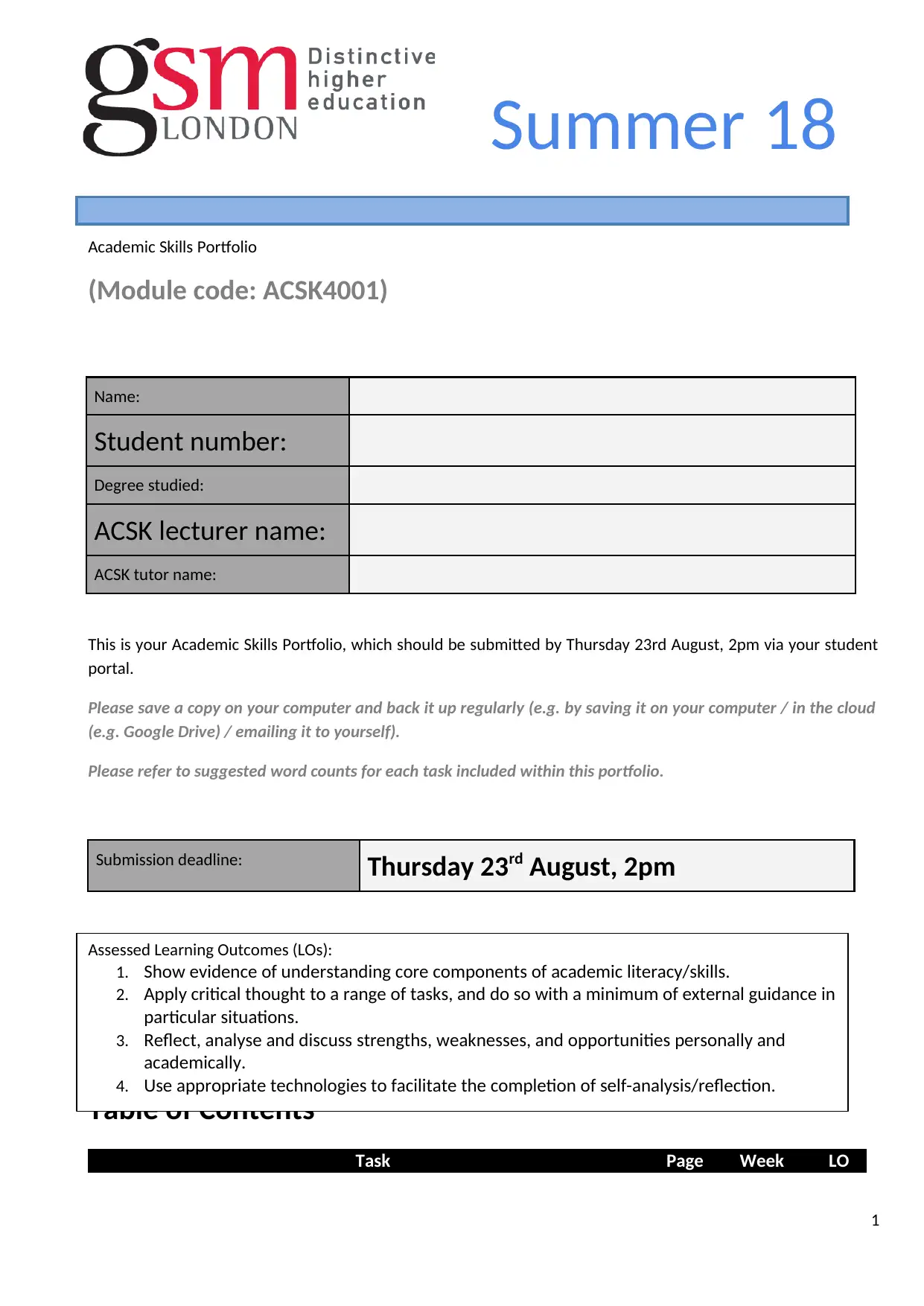
Summer 18
Academic Skills Portfolio
(Module code: ACSK4001)
Name:
Student number:
Degree studied:
ACSK lecturer name:
ACSK tutor name:
This is your Academic Skills Portfolio, which should be submitted by Thursday 23rd August, 2pm via your student
portal.
Please save a copy on your computer and back it up regularly (e.g. by saving it on your computer / in the cloud
(e.g. Google Drive) / emailing it to yourself).
Please refer to suggested word counts for each task included within this portfolio.
Submission deadline: Thursday 23rd August, 2pm
Table of Contents
Task Page Week LO
1
Assessed Learning Outcomes (LOs):
1. Show evidence of understanding core components of academic literacy/skills.
2. Apply critical thought to a range of tasks, and do so with a minimum of external guidance in
particular situations.
3. Reflect, analyse and discuss strengths, weaknesses, and opportunities personally and
academically.
4. Use appropriate technologies to facilitate the completion of self-analysis/reflection.
Academic Skills Portfolio
(Module code: ACSK4001)
Name:
Student number:
Degree studied:
ACSK lecturer name:
ACSK tutor name:
This is your Academic Skills Portfolio, which should be submitted by Thursday 23rd August, 2pm via your student
portal.
Please save a copy on your computer and back it up regularly (e.g. by saving it on your computer / in the cloud
(e.g. Google Drive) / emailing it to yourself).
Please refer to suggested word counts for each task included within this portfolio.
Submission deadline: Thursday 23rd August, 2pm
Table of Contents
Task Page Week LO
1
Assessed Learning Outcomes (LOs):
1. Show evidence of understanding core components of academic literacy/skills.
2. Apply critical thought to a range of tasks, and do so with a minimum of external guidance in
particular situations.
3. Reflect, analyse and discuss strengths, weaknesses, and opportunities personally and
academically.
4. Use appropriate technologies to facilitate the completion of self-analysis/reflection.
Paraphrase This Document
Need a fresh take? Get an instant paraphrase of this document with our AI Paraphraser
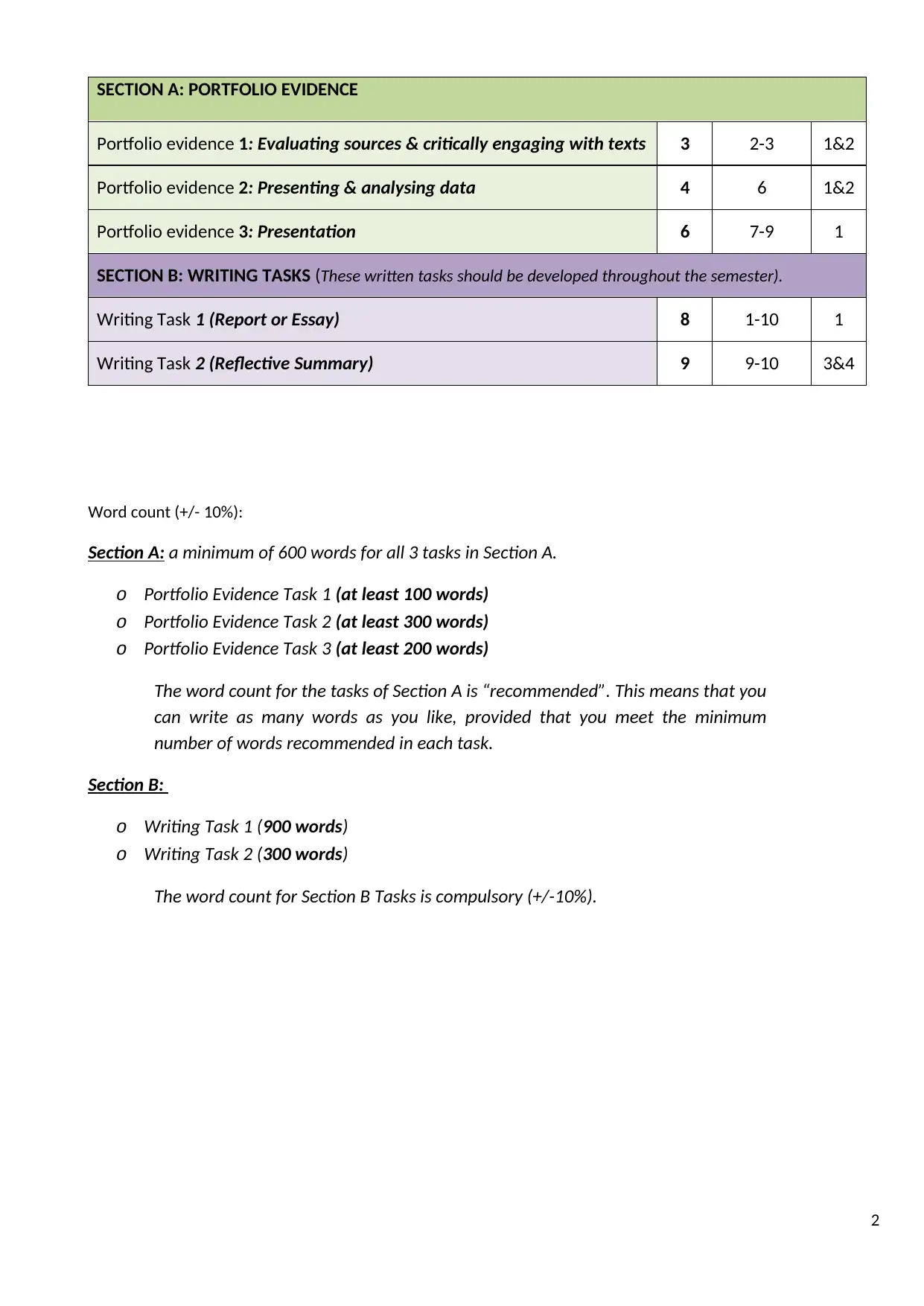
SECTION A: PORTFOLIO EVIDENCE
Portfolio evidence 1: Evaluating sources & critically engaging with texts 3 2-3 1&2
Portfolio evidence 2: Presenting & analysing data 4 6 1&2
Portfolio evidence 3: Presentation 6 7-9 1
SECTION B: WRITING TASKS (These written tasks should be developed throughout the semester).
Writing Task 1 (Report or Essay) 8 1-10 1
Writing Task 2 (Reflective Summary) 9 9-10 3&4
Word count (+/- 10%):
Section A: a minimum of 600 words for all 3 tasks in Section A.
o Portfolio Evidence Task 1 (at least 100 words)
o Portfolio Evidence Task 2 (at least 300 words)
o Portfolio Evidence Task 3 (at least 200 words)
The word count for the tasks of Section A is “recommended”. This means that you
can write as many words as you like, provided that you meet the minimum
number of words recommended in each task.
Section B:
o Writing Task 1 (900 words)
o Writing Task 2 (300 words)
The word count for Section B Tasks is compulsory (+/-10%).
2
Portfolio evidence 1: Evaluating sources & critically engaging with texts 3 2-3 1&2
Portfolio evidence 2: Presenting & analysing data 4 6 1&2
Portfolio evidence 3: Presentation 6 7-9 1
SECTION B: WRITING TASKS (These written tasks should be developed throughout the semester).
Writing Task 1 (Report or Essay) 8 1-10 1
Writing Task 2 (Reflective Summary) 9 9-10 3&4
Word count (+/- 10%):
Section A: a minimum of 600 words for all 3 tasks in Section A.
o Portfolio Evidence Task 1 (at least 100 words)
o Portfolio Evidence Task 2 (at least 300 words)
o Portfolio Evidence Task 3 (at least 200 words)
The word count for the tasks of Section A is “recommended”. This means that you
can write as many words as you like, provided that you meet the minimum
number of words recommended in each task.
Section B:
o Writing Task 1 (900 words)
o Writing Task 2 (300 words)
The word count for Section B Tasks is compulsory (+/-10%).
2
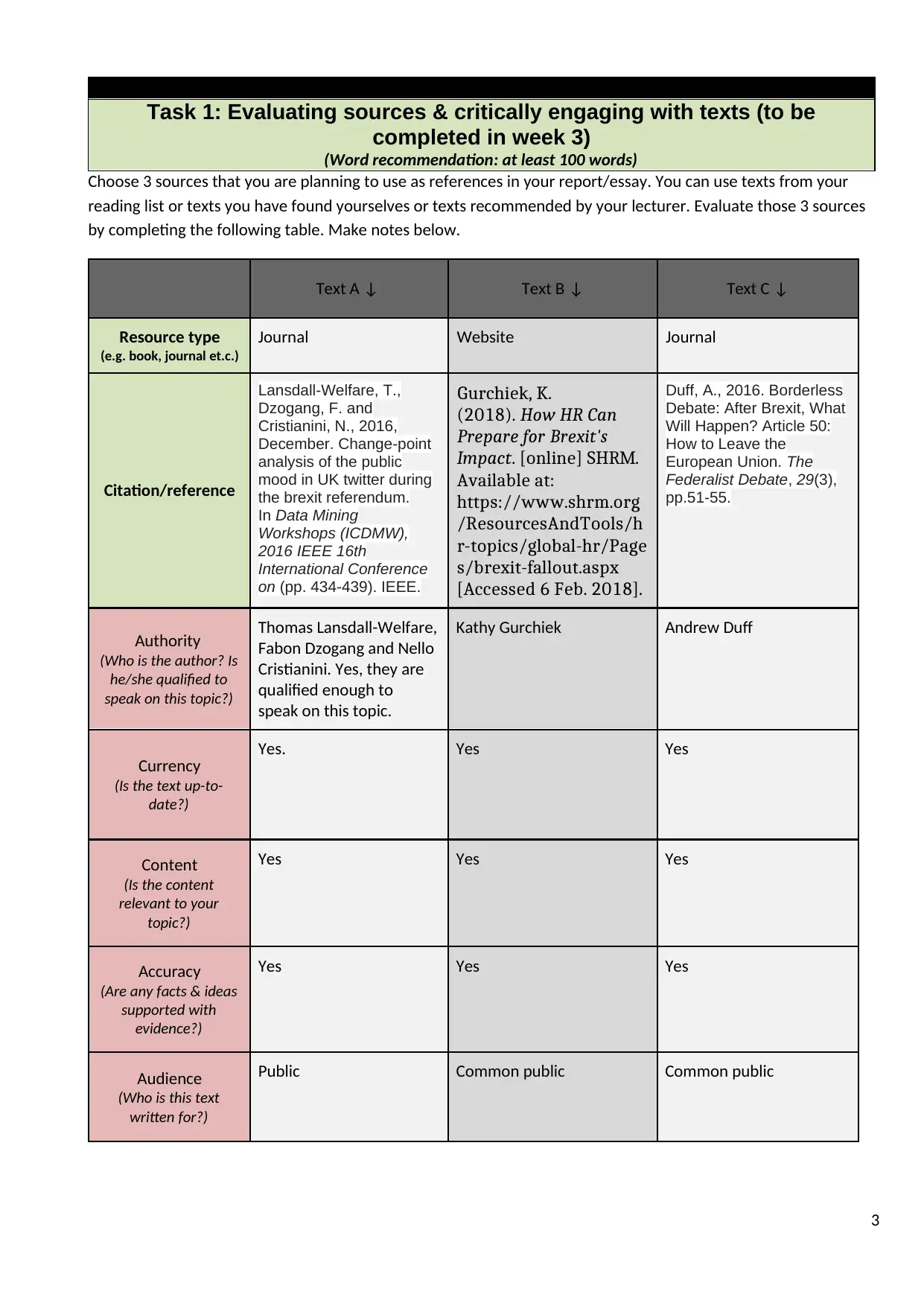
SECTION A: PORTFOLIO EVIDENCE
Task 1: Evaluating sources & critically engaging with texts (to be
completed in week 3)
(Word recommendation: at least 100 words)
Choose 3 sources that you are planning to use as references in your report/essay. You can use texts from your
reading list or texts you have found yourselves or texts recommended by your lecturer. Evaluate those 3 sources
by completing the following table. Make notes below.
Text A ↓ Text B ↓ Text C ↓
Resource type
(e.g. book, journal et.c.)
Journal Website Journal
Citation/reference
Lansdall-Welfare, T.,
Dzogang, F. and
Cristianini, N., 2016,
December. Change-point
analysis of the public
mood in UK twitter during
the brexit referendum.
In Data Mining
Workshops (ICDMW),
2016 IEEE 16th
International Conference
on (pp. 434-439). IEEE.
Gurchiek, K.
(2018). How HR Can
Prepare for Brexit's
Impact. [online] SHRM.
Available at:
https://www.shrm.org
/ResourcesAndTools/h
r-topics/global-hr/Page
s/brexit-fallout.aspx
[Accessed 6 Feb. 2018].
Duff, A., 2016. Borderless
Debate: After Brexit, What
Will Happen? Article 50:
How to Leave the
European Union. The
Federalist Debate, 29(3),
pp.51-55.
Authority
(Who is the author? Is
he/she qualified to
speak on this topic?)
Thomas Lansdall-Welfare,
Fabon Dzogang and Nello
Cristianini. Yes, they are
qualified enough to
speak on this topic.
Kathy Gurchiek Andrew Duff
Currency
(Is the text up-to-
date?)
Yes. Yes Yes
Content
(Is the content
relevant to your
topic?)
Yes Yes Yes
Accuracy
(Are any facts & ideas
supported with
evidence?)
Yes Yes Yes
Audience
(Who is this text
written for?)
Public Common public Common public
3
Task 1: Evaluating sources & critically engaging with texts (to be
completed in week 3)
(Word recommendation: at least 100 words)
Choose 3 sources that you are planning to use as references in your report/essay. You can use texts from your
reading list or texts you have found yourselves or texts recommended by your lecturer. Evaluate those 3 sources
by completing the following table. Make notes below.
Text A ↓ Text B ↓ Text C ↓
Resource type
(e.g. book, journal et.c.)
Journal Website Journal
Citation/reference
Lansdall-Welfare, T.,
Dzogang, F. and
Cristianini, N., 2016,
December. Change-point
analysis of the public
mood in UK twitter during
the brexit referendum.
In Data Mining
Workshops (ICDMW),
2016 IEEE 16th
International Conference
on (pp. 434-439). IEEE.
Gurchiek, K.
(2018). How HR Can
Prepare for Brexit's
Impact. [online] SHRM.
Available at:
https://www.shrm.org
/ResourcesAndTools/h
r-topics/global-hr/Page
s/brexit-fallout.aspx
[Accessed 6 Feb. 2018].
Duff, A., 2016. Borderless
Debate: After Brexit, What
Will Happen? Article 50:
How to Leave the
European Union. The
Federalist Debate, 29(3),
pp.51-55.
Authority
(Who is the author? Is
he/she qualified to
speak on this topic?)
Thomas Lansdall-Welfare,
Fabon Dzogang and Nello
Cristianini. Yes, they are
qualified enough to
speak on this topic.
Kathy Gurchiek Andrew Duff
Currency
(Is the text up-to-
date?)
Yes. Yes Yes
Content
(Is the content
relevant to your
topic?)
Yes Yes Yes
Accuracy
(Are any facts & ideas
supported with
evidence?)
Yes Yes Yes
Audience
(Who is this text
written for?)
Public Common public Common public
3
⊘ This is a preview!⊘
Do you want full access?
Subscribe today to unlock all pages.

Trusted by 1+ million students worldwide
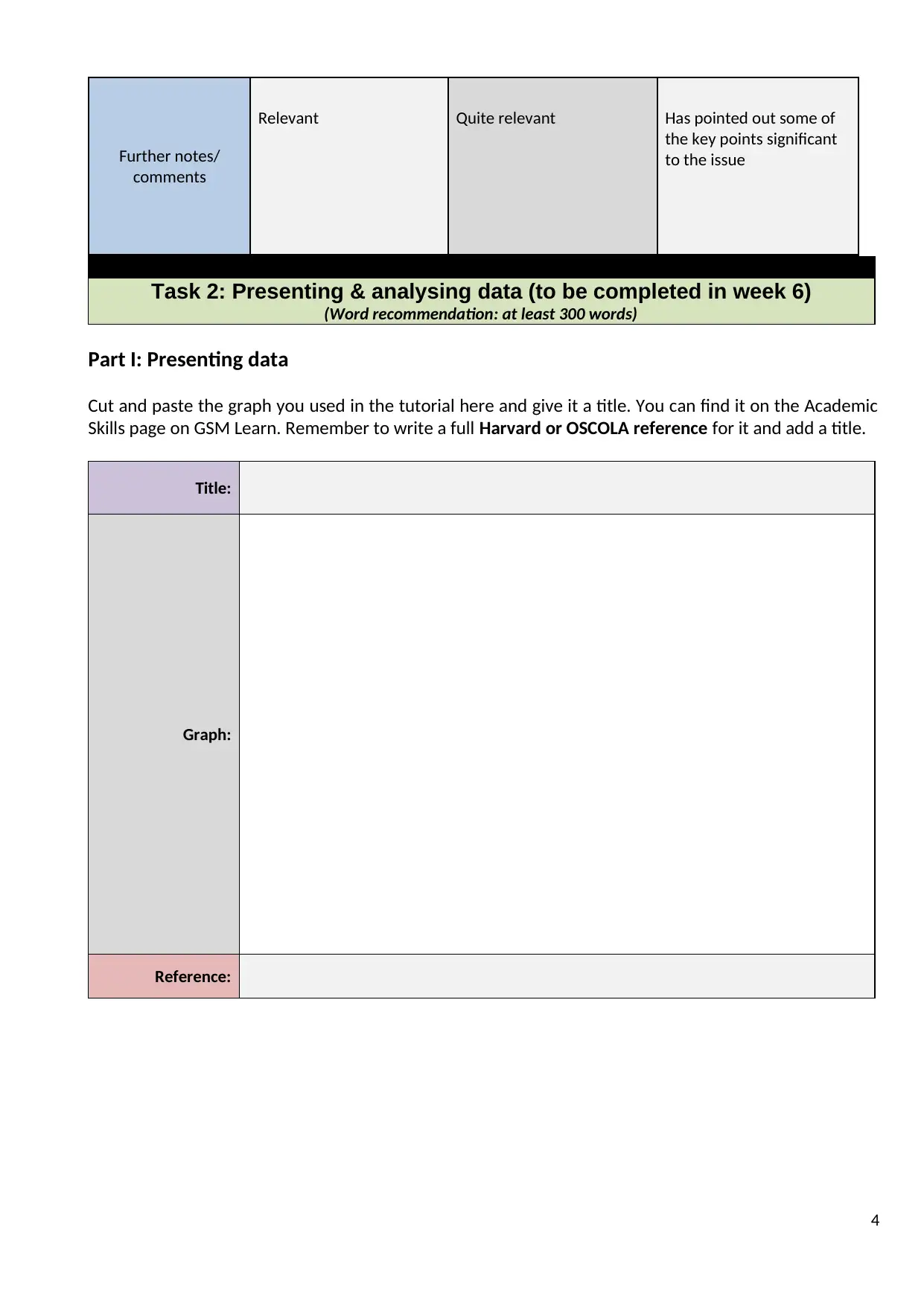
Further notes/
comments
Relevant Quite relevant Has pointed out some of
the key points significant
to the issue
SECTION A: PORTFOLIO EVIDENCE
Task 2: Presenting & analysing data (to be completed in week 6)
(Word recommendation: at least 300 words)
Part I: Presenting data
Cut and paste the graph you used in the tutorial here and give it a title. You can find it on the Academic
Skills page on GSM Learn. Remember to write a full Harvard or OSCOLA reference for it and add a title.
Title:
Graph:
Reference:
4
comments
Relevant Quite relevant Has pointed out some of
the key points significant
to the issue
SECTION A: PORTFOLIO EVIDENCE
Task 2: Presenting & analysing data (to be completed in week 6)
(Word recommendation: at least 300 words)
Part I: Presenting data
Cut and paste the graph you used in the tutorial here and give it a title. You can find it on the Academic
Skills page on GSM Learn. Remember to write a full Harvard or OSCOLA reference for it and add a title.
Title:
Graph:
Reference:
4
Paraphrase This Document
Need a fresh take? Get an instant paraphrase of this document with our AI Paraphraser

5
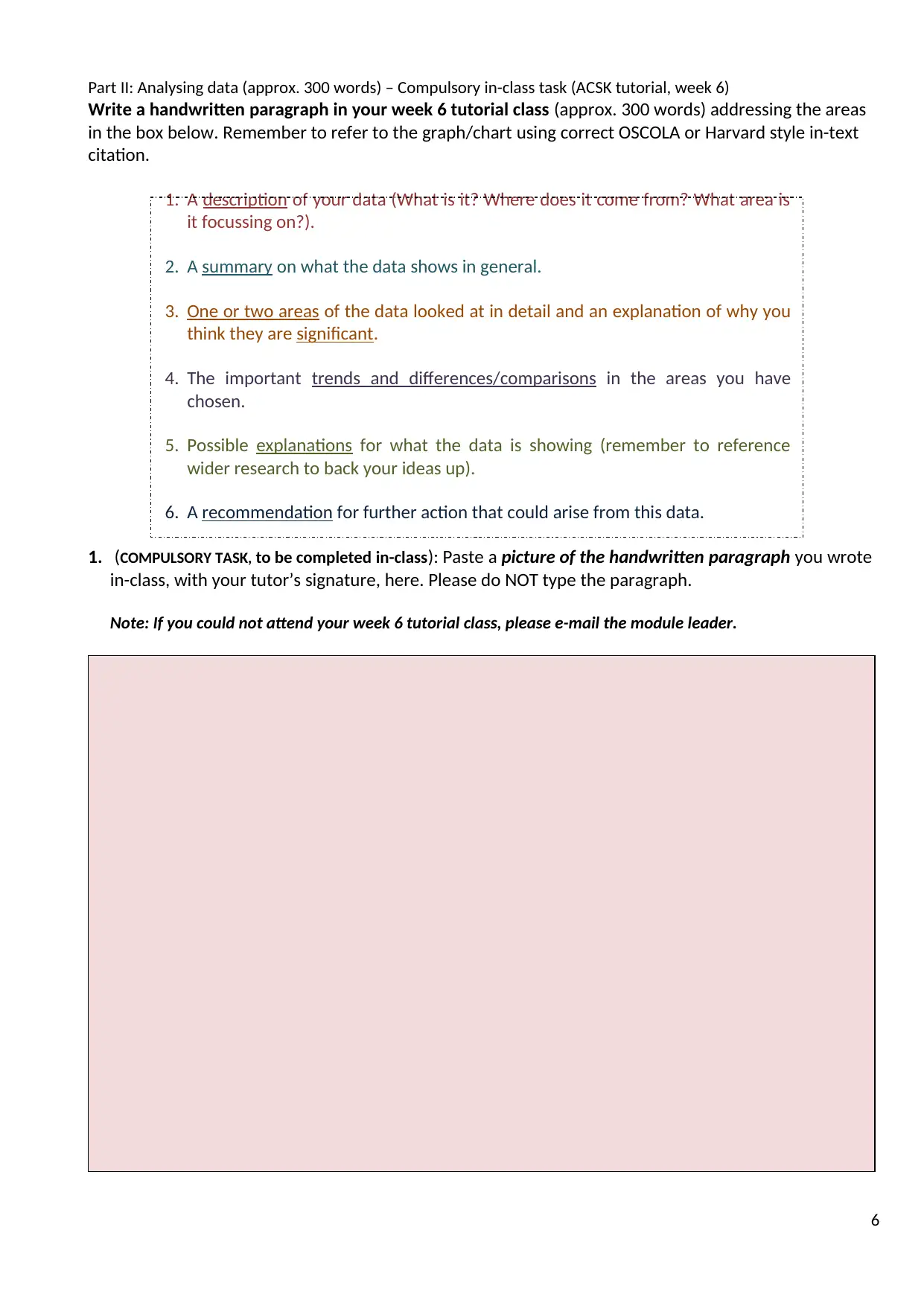
Part II: Analysing data (approx. 300 words) – Compulsory in-class task (ACSK tutorial, week 6)
Write a handwritten paragraph in your week 6 tutorial class (approx. 300 words) addressing the areas
in the box below. Remember to refer to the graph/chart using correct OSCOLA or Harvard style in-text
citation.
1. A description of your data (What is it? Where does it come from? What area is
it focussing on?).
2. A summary on what the data shows in general.
3. One or two areas of the data looked at in detail and an explanation of why you
think they are significant.
4. The important trends and differences/comparisons in the areas you have
chosen.
5. Possible explanations for what the data is showing (remember to reference
wider research to back your ideas up).
6. A recommendation for further action that could arise from this data.
1. (COMPULSORY TASK, to be completed in-class): Paste a picture of the handwritten paragraph you wrote
in-class, with your tutor’s signature, here. Please do NOT type the paragraph.
Note: If you could not attend your week 6 tutorial class, please e-mail the module leader.
6
Write a handwritten paragraph in your week 6 tutorial class (approx. 300 words) addressing the areas
in the box below. Remember to refer to the graph/chart using correct OSCOLA or Harvard style in-text
citation.
1. A description of your data (What is it? Where does it come from? What area is
it focussing on?).
2. A summary on what the data shows in general.
3. One or two areas of the data looked at in detail and an explanation of why you
think they are significant.
4. The important trends and differences/comparisons in the areas you have
chosen.
5. Possible explanations for what the data is showing (remember to reference
wider research to back your ideas up).
6. A recommendation for further action that could arise from this data.
1. (COMPULSORY TASK, to be completed in-class): Paste a picture of the handwritten paragraph you wrote
in-class, with your tutor’s signature, here. Please do NOT type the paragraph.
Note: If you could not attend your week 6 tutorial class, please e-mail the module leader.
6
⊘ This is a preview!⊘
Do you want full access?
Subscribe today to unlock all pages.

Trusted by 1+ million students worldwide
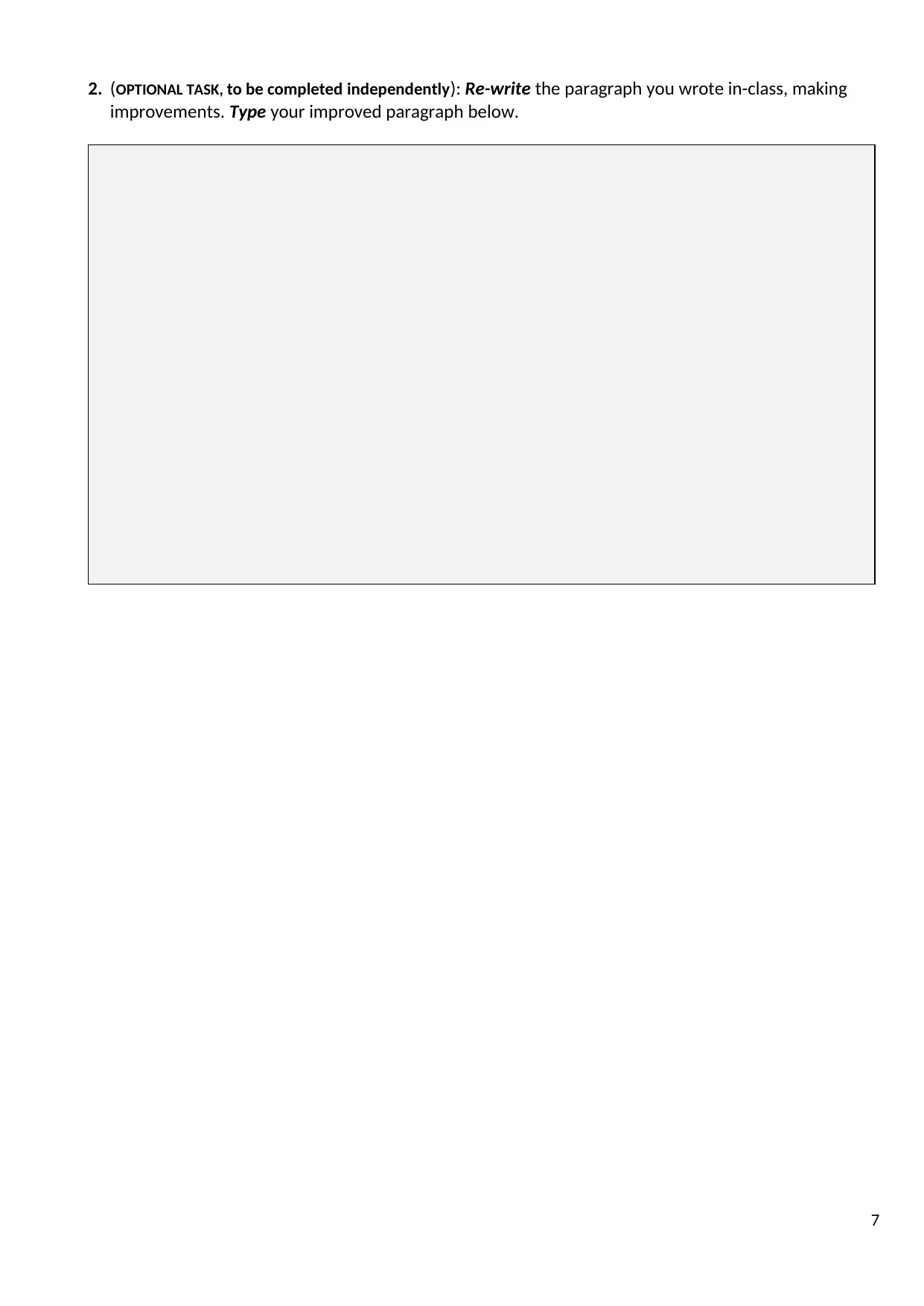
2. (OPTIONAL TASK, to be completed independently): Re-write the paragraph you wrote in-class, making
improvements. Type your improved paragraph below.
7
improvements. Type your improved paragraph below.
7
Paraphrase This Document
Need a fresh take? Get an instant paraphrase of this document with our AI Paraphraser
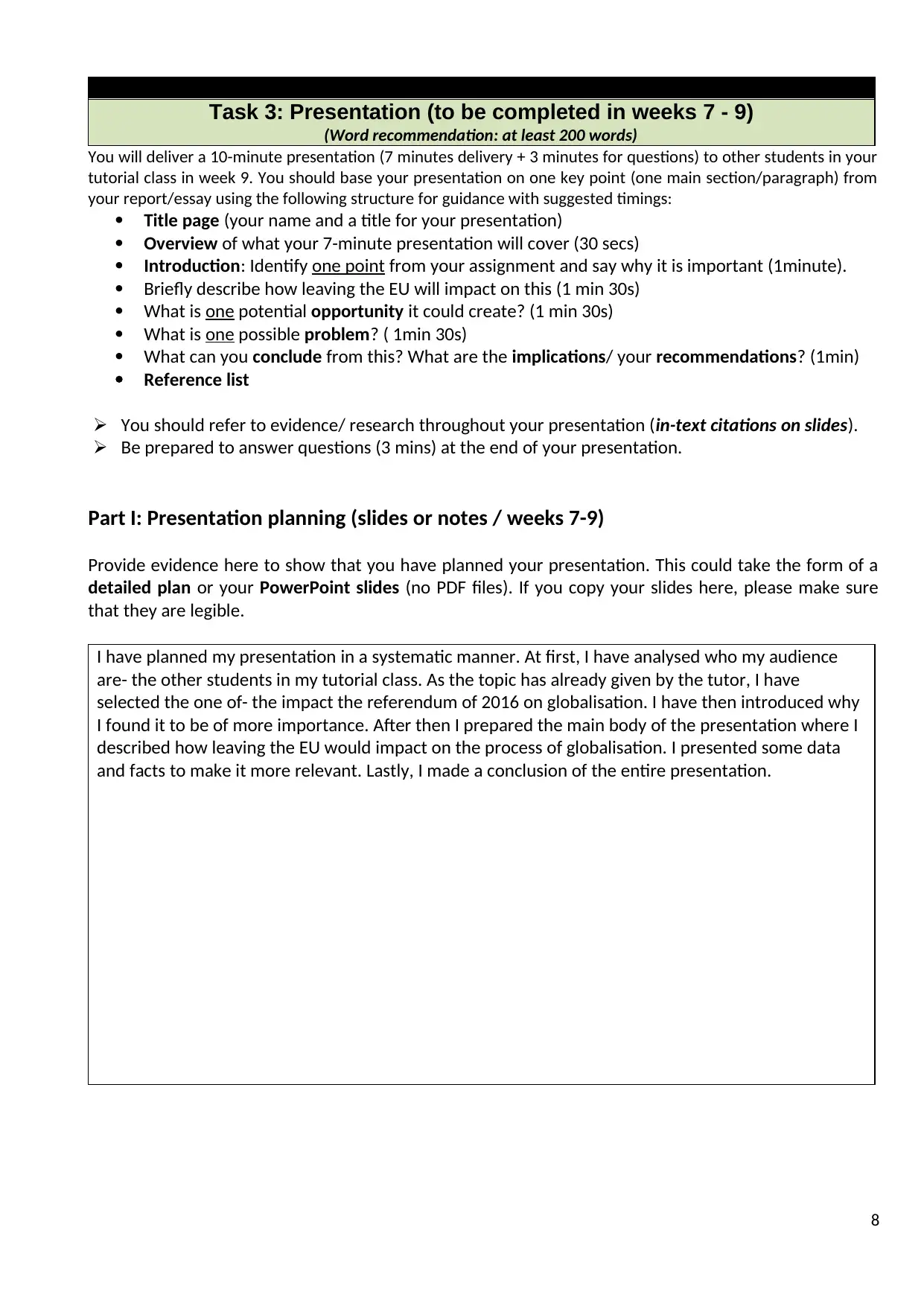
SECTION A: PORTFOLIO EVIDENCE
Task 3: Presentation (to be completed in weeks 7 - 9)
(Word recommendation: at least 200 words)
You will deliver a 10-minute presentation (7 minutes delivery + 3 minutes for questions) to other students in your
tutorial class in week 9. You should base your presentation on one key point (one main section/paragraph) from
your report/essay using the following structure for guidance with suggested timings:
Title page (your name and a title for your presentation)
Overview of what your 7-minute presentation will cover (30 secs)
Introduction: Identify one point from your assignment and say why it is important (1minute).
Briefly describe how leaving the EU will impact on this (1 min 30s)
What is one potential opportunity it could create? (1 min 30s)
What is one possible problem? ( 1min 30s)
What can you conclude from this? What are the implications/ your recommendations? (1min)
Reference list
You should refer to evidence/ research throughout your presentation (in-text citations on slides).
Be prepared to answer questions (3 mins) at the end of your presentation.
Part I: Presentation planning (slides or notes / weeks 7-9)
Provide evidence here to show that you have planned your presentation. This could take the form of a
detailed plan or your PowerPoint slides (no PDF files). If you copy your slides here, please make sure
that they are legible.
I have planned my presentation in a systematic manner. At first, I have analysed who my audience
are- the other students in my tutorial class. As the topic has already given by the tutor, I have
selected the one of- the impact the referendum of 2016 on globalisation. I have then introduced why
I found it to be of more importance. After then I prepared the main body of the presentation where I
described how leaving the EU would impact on the process of globalisation. I presented some data
and facts to make it more relevant. Lastly, I made a conclusion of the entire presentation.
8
Task 3: Presentation (to be completed in weeks 7 - 9)
(Word recommendation: at least 200 words)
You will deliver a 10-minute presentation (7 minutes delivery + 3 minutes for questions) to other students in your
tutorial class in week 9. You should base your presentation on one key point (one main section/paragraph) from
your report/essay using the following structure for guidance with suggested timings:
Title page (your name and a title for your presentation)
Overview of what your 7-minute presentation will cover (30 secs)
Introduction: Identify one point from your assignment and say why it is important (1minute).
Briefly describe how leaving the EU will impact on this (1 min 30s)
What is one potential opportunity it could create? (1 min 30s)
What is one possible problem? ( 1min 30s)
What can you conclude from this? What are the implications/ your recommendations? (1min)
Reference list
You should refer to evidence/ research throughout your presentation (in-text citations on slides).
Be prepared to answer questions (3 mins) at the end of your presentation.
Part I: Presentation planning (slides or notes / weeks 7-9)
Provide evidence here to show that you have planned your presentation. This could take the form of a
detailed plan or your PowerPoint slides (no PDF files). If you copy your slides here, please make sure
that they are legible.
I have planned my presentation in a systematic manner. At first, I have analysed who my audience
are- the other students in my tutorial class. As the topic has already given by the tutor, I have
selected the one of- the impact the referendum of 2016 on globalisation. I have then introduced why
I found it to be of more importance. After then I prepared the main body of the presentation where I
described how leaving the EU would impact on the process of globalisation. I presented some data
and facts to make it more relevant. Lastly, I made a conclusion of the entire presentation.
8
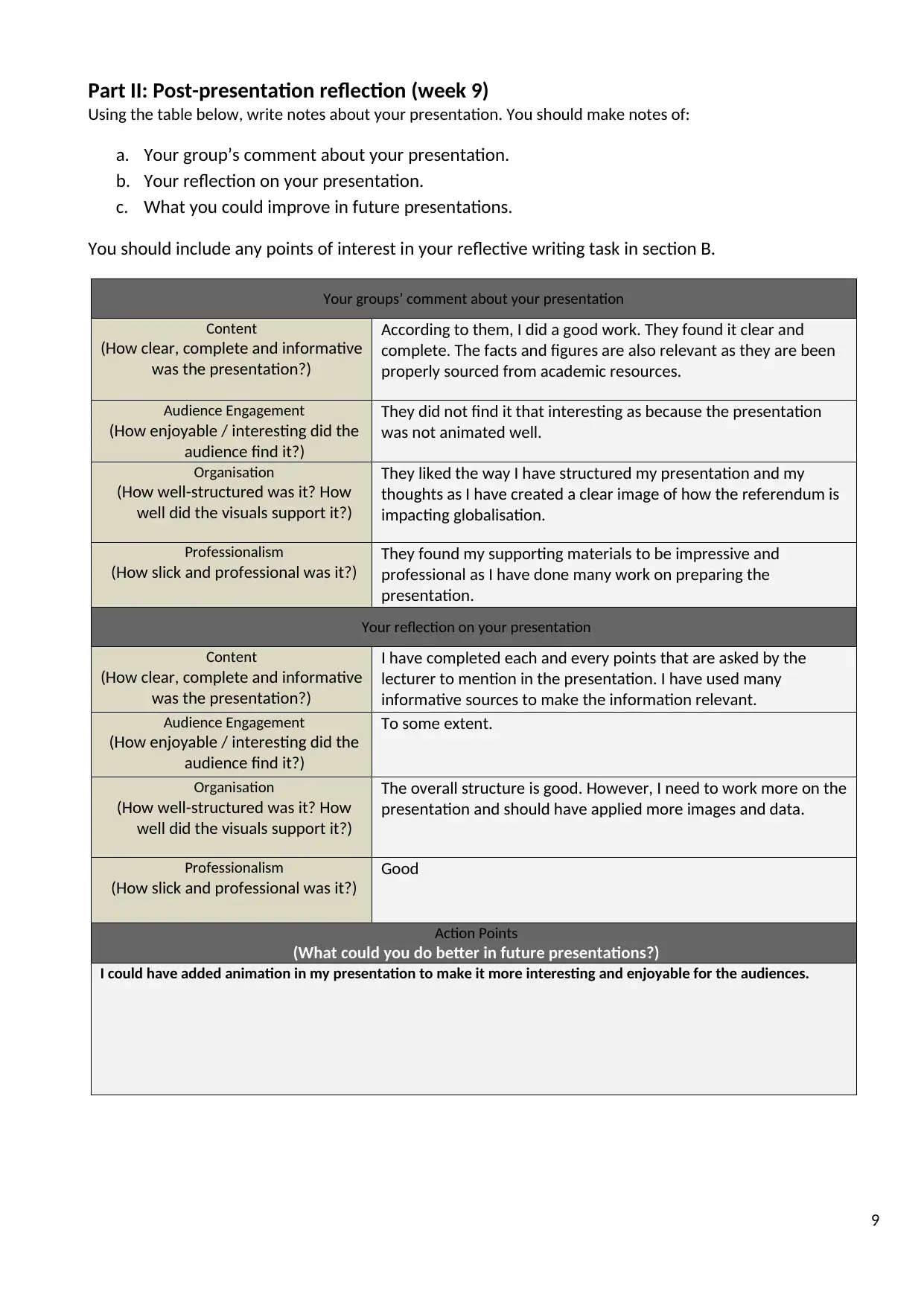
Part II: Post-presentation reflection (week 9)
Using the table below, write notes about your presentation. You should make notes of:
a. Your group’s comment about your presentation.
b. Your reflection on your presentation.
c. What you could improve in future presentations.
You should include any points of interest in your reflective writing task in section B.
Your groups’ comment about your presentation
Content
(How clear, complete and informative
was the presentation?)
According to them, I did a good work. They found it clear and
complete. The facts and figures are also relevant as they are been
properly sourced from academic resources.
Audience Engagement
(How enjoyable / interesting did the
audience find it?)
They did not find it that interesting as because the presentation
was not animated well.
Organisation
(How well-structured was it? How
well did the visuals support it?)
They liked the way I have structured my presentation and my
thoughts as I have created a clear image of how the referendum is
impacting globalisation.
Professionalism
(How slick and professional was it?)
They found my supporting materials to be impressive and
professional as I have done many work on preparing the
presentation.
Your reflection on your presentation
Content
(How clear, complete and informative
was the presentation?)
I have completed each and every points that are asked by the
lecturer to mention in the presentation. I have used many
informative sources to make the information relevant.
Audience Engagement
(How enjoyable / interesting did the
audience find it?)
To some extent.
Organisation
(How well-structured was it? How
well did the visuals support it?)
The overall structure is good. However, I need to work more on the
presentation and should have applied more images and data.
Professionalism
(How slick and professional was it?)
Good
Action Points
(What could you do better in future presentations?)
I could have added animation in my presentation to make it more interesting and enjoyable for the audiences.
9
Using the table below, write notes about your presentation. You should make notes of:
a. Your group’s comment about your presentation.
b. Your reflection on your presentation.
c. What you could improve in future presentations.
You should include any points of interest in your reflective writing task in section B.
Your groups’ comment about your presentation
Content
(How clear, complete and informative
was the presentation?)
According to them, I did a good work. They found it clear and
complete. The facts and figures are also relevant as they are been
properly sourced from academic resources.
Audience Engagement
(How enjoyable / interesting did the
audience find it?)
They did not find it that interesting as because the presentation
was not animated well.
Organisation
(How well-structured was it? How
well did the visuals support it?)
They liked the way I have structured my presentation and my
thoughts as I have created a clear image of how the referendum is
impacting globalisation.
Professionalism
(How slick and professional was it?)
They found my supporting materials to be impressive and
professional as I have done many work on preparing the
presentation.
Your reflection on your presentation
Content
(How clear, complete and informative
was the presentation?)
I have completed each and every points that are asked by the
lecturer to mention in the presentation. I have used many
informative sources to make the information relevant.
Audience Engagement
(How enjoyable / interesting did the
audience find it?)
To some extent.
Organisation
(How well-structured was it? How
well did the visuals support it?)
The overall structure is good. However, I need to work more on the
presentation and should have applied more images and data.
Professionalism
(How slick and professional was it?)
Good
Action Points
(What could you do better in future presentations?)
I could have added animation in my presentation to make it more interesting and enjoyable for the audiences.
9
⊘ This is a preview!⊘
Do you want full access?
Subscribe today to unlock all pages.

Trusted by 1+ million students worldwide
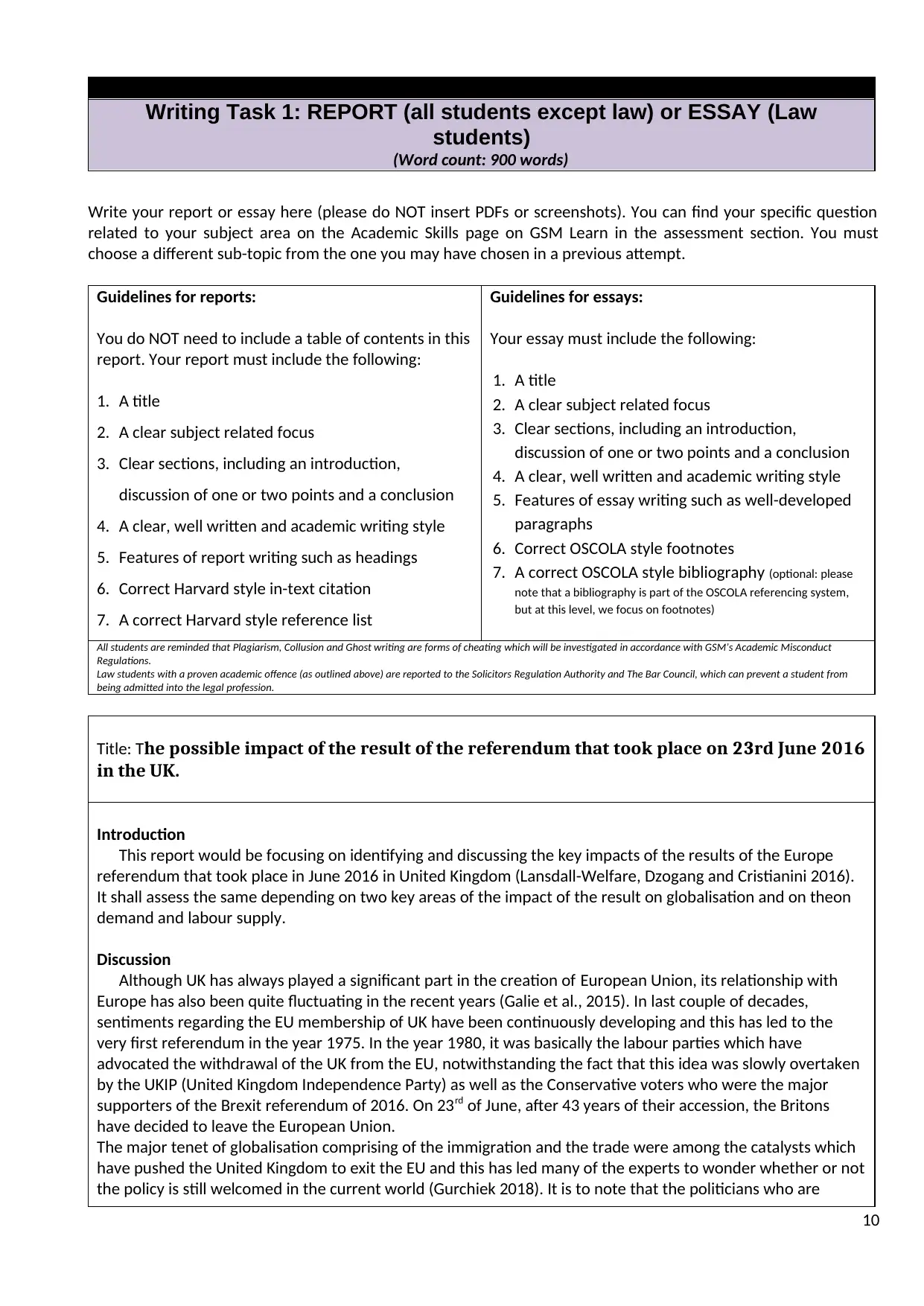
SECTION B: WRITING TASKS
Writing Task 1: REPORT (all students except law) or ESSAY (Law
students)
(Word count: 900 words)
Write your report or essay here (please do NOT insert PDFs or screenshots). You can find your specific question
related to your subject area on the Academic Skills page on GSM Learn in the assessment section. You must
choose a different sub-topic from the one you may have chosen in a previous attempt.
Guidelines for reports:
You do NOT need to include a table of contents in this
report. Your report must include the following:
1. A title
2. A clear subject related focus
3. Clear sections, including an introduction,
discussion of one or two points and a conclusion
4. A clear, well written and academic writing style
5. Features of report writing such as headings
6. Correct Harvard style in-text citation
7. A correct Harvard style reference list
Guidelines for essays:
Your essay must include the following:
1. A title
2. A clear subject related focus
3. Clear sections, including an introduction,
discussion of one or two points and a conclusion
4. A clear, well written and academic writing style
5. Features of essay writing such as well-developed
paragraphs
6. Correct OSCOLA style footnotes
7. A correct OSCOLA style bibliography (optional: please
note that a bibliography is part of the OSCOLA referencing system,
but at this level, we focus on footnotes)
All students are reminded that Plagiarism, Collusion and Ghost writing are forms of cheating which will be investigated in accordance with GSM’s Academic Misconduct
Regulations.
Law students with a proven academic offence (as outlined above) are reported to the Solicitors Regulation Authority and The Bar Council, which can prevent a student from
being admitted into the legal profession.
Title: The possible impact of the result of the referendum that took place on 23rd June 2016
in the UK.
Introduction
This report would be focusing on identifying and discussing the key impacts of the results of the Europe
referendum that took place in June 2016 in United Kingdom (Lansdall-Welfare, Dzogang and Cristianini 2016).
It shall assess the same depending on two key areas of the impact of the result on globalisation and on theon
demand and labour supply.
Discussion
Although UK has always played a significant part in the creation of European Union, its relationship with
Europe has also been quite fluctuating in the recent years (Galie et al., 2015). In last couple of decades,
sentiments regarding the EU membership of UK have been continuously developing and this has led to the
very first referendum in the year 1975. In the year 1980, it was basically the labour parties which have
advocated the withdrawal of the UK from the EU, notwithstanding the fact that this idea was slowly overtaken
by the UKIP (United Kingdom Independence Party) as well as the Conservative voters who were the major
supporters of the Brexit referendum of 2016. On 23rd of June, after 43 years of their accession, the Britons
have decided to leave the European Union.
The major tenet of globalisation comprising of the immigration and the trade were among the catalysts which
have pushed the United Kingdom to exit the EU and this has led many of the experts to wonder whether or not
the policy is still welcomed in the current world (Gurchiek 2018). It is to note that the politicians who are
10
Writing Task 1: REPORT (all students except law) or ESSAY (Law
students)
(Word count: 900 words)
Write your report or essay here (please do NOT insert PDFs or screenshots). You can find your specific question
related to your subject area on the Academic Skills page on GSM Learn in the assessment section. You must
choose a different sub-topic from the one you may have chosen in a previous attempt.
Guidelines for reports:
You do NOT need to include a table of contents in this
report. Your report must include the following:
1. A title
2. A clear subject related focus
3. Clear sections, including an introduction,
discussion of one or two points and a conclusion
4. A clear, well written and academic writing style
5. Features of report writing such as headings
6. Correct Harvard style in-text citation
7. A correct Harvard style reference list
Guidelines for essays:
Your essay must include the following:
1. A title
2. A clear subject related focus
3. Clear sections, including an introduction,
discussion of one or two points and a conclusion
4. A clear, well written and academic writing style
5. Features of essay writing such as well-developed
paragraphs
6. Correct OSCOLA style footnotes
7. A correct OSCOLA style bibliography (optional: please
note that a bibliography is part of the OSCOLA referencing system,
but at this level, we focus on footnotes)
All students are reminded that Plagiarism, Collusion and Ghost writing are forms of cheating which will be investigated in accordance with GSM’s Academic Misconduct
Regulations.
Law students with a proven academic offence (as outlined above) are reported to the Solicitors Regulation Authority and The Bar Council, which can prevent a student from
being admitted into the legal profession.
Title: The possible impact of the result of the referendum that took place on 23rd June 2016
in the UK.
Introduction
This report would be focusing on identifying and discussing the key impacts of the results of the Europe
referendum that took place in June 2016 in United Kingdom (Lansdall-Welfare, Dzogang and Cristianini 2016).
It shall assess the same depending on two key areas of the impact of the result on globalisation and on theon
demand and labour supply.
Discussion
Although UK has always played a significant part in the creation of European Union, its relationship with
Europe has also been quite fluctuating in the recent years (Galie et al., 2015). In last couple of decades,
sentiments regarding the EU membership of UK have been continuously developing and this has led to the
very first referendum in the year 1975. In the year 1980, it was basically the labour parties which have
advocated the withdrawal of the UK from the EU, notwithstanding the fact that this idea was slowly overtaken
by the UKIP (United Kingdom Independence Party) as well as the Conservative voters who were the major
supporters of the Brexit referendum of 2016. On 23rd of June, after 43 years of their accession, the Britons
have decided to leave the European Union.
The major tenet of globalisation comprising of the immigration and the trade were among the catalysts which
have pushed the United Kingdom to exit the EU and this has led many of the experts to wonder whether or not
the policy is still welcomed in the current world (Gurchiek 2018). It is to note that the politicians who are
10
Paraphrase This Document
Need a fresh take? Get an instant paraphrase of this document with our AI Paraphraser
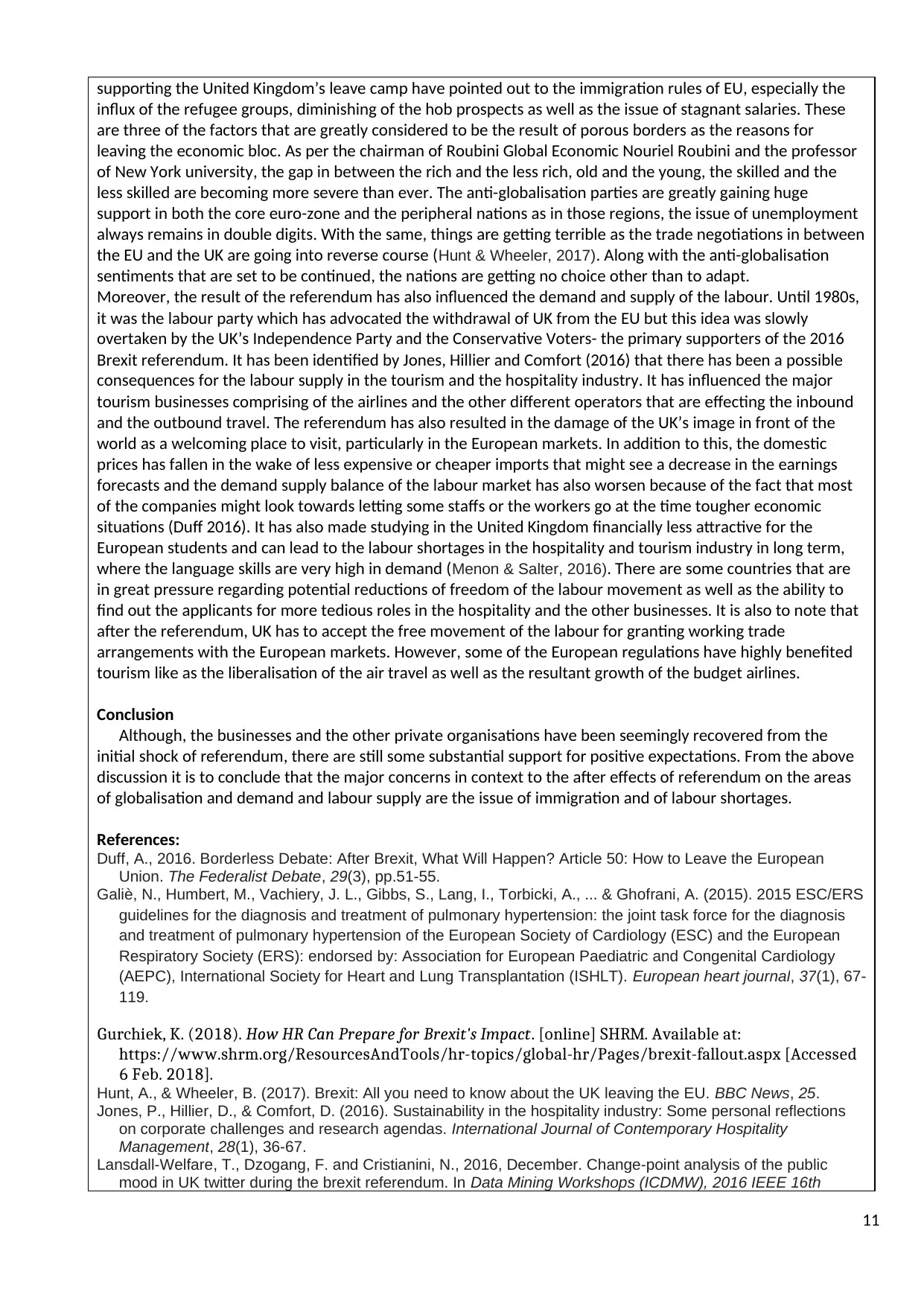
supporting the United Kingdom’s leave camp have pointed out to the immigration rules of EU, especially the
influx of the refugee groups, diminishing of the hob prospects as well as the issue of stagnant salaries. These
are three of the factors that are greatly considered to be the result of porous borders as the reasons for
leaving the economic bloc. As per the chairman of Roubini Global Economic Nouriel Roubini and the professor
of New York university, the gap in between the rich and the less rich, old and the young, the skilled and the
less skilled are becoming more severe than ever. The anti-globalisation parties are greatly gaining huge
support in both the core euro-zone and the peripheral nations as in those regions, the issue of unemployment
always remains in double digits. With the same, things are getting terrible as the trade negotiations in between
the EU and the UK are going into reverse course (Hunt & Wheeler, 2017). Along with the anti-globalisation
sentiments that are set to be continued, the nations are getting no choice other than to adapt.
Moreover, the result of the referendum has also influenced the demand and supply of the labour. Until 1980s,
it was the labour party which has advocated the withdrawal of UK from the EU but this idea was slowly
overtaken by the UK’s Independence Party and the Conservative Voters- the primary supporters of the 2016
Brexit referendum. It has been identified by Jones, Hillier and Comfort (2016) that there has been a possible
consequences for the labour supply in the tourism and the hospitality industry. It has influenced the major
tourism businesses comprising of the airlines and the other different operators that are effecting the inbound
and the outbound travel. The referendum has also resulted in the damage of the UK’s image in front of the
world as a welcoming place to visit, particularly in the European markets. In addition to this, the domestic
prices has fallen in the wake of less expensive or cheaper imports that might see a decrease in the earnings
forecasts and the demand supply balance of the labour market has also worsen because of the fact that most
of the companies might look towards letting some staffs or the workers go at the time tougher economic
situations (Duff 2016). It has also made studying in the United Kingdom financially less attractive for the
European students and can lead to the labour shortages in the hospitality and tourism industry in long term,
where the language skills are very high in demand (Menon & Salter, 2016). There are some countries that are
in great pressure regarding potential reductions of freedom of the labour movement as well as the ability to
find out the applicants for more tedious roles in the hospitality and the other businesses. It is also to note that
after the referendum, UK has to accept the free movement of the labour for granting working trade
arrangements with the European markets. However, some of the European regulations have highly benefited
tourism like as the liberalisation of the air travel as well as the resultant growth of the budget airlines.
Conclusion
Although, the businesses and the other private organisations have been seemingly recovered from the
initial shock of referendum, there are still some substantial support for positive expectations. From the above
discussion it is to conclude that the major concerns in context to the after effects of referendum on the areas
of globalisation and demand and labour supply are the issue of immigration and of labour shortages.
References:
Duff, A., 2016. Borderless Debate: After Brexit, What Will Happen? Article 50: How to Leave the European
Union. The Federalist Debate, 29(3), pp.51-55.
Galiè, N., Humbert, M., Vachiery, J. L., Gibbs, S., Lang, I., Torbicki, A., ... & Ghofrani, A. (2015). 2015 ESC/ERS
guidelines for the diagnosis and treatment of pulmonary hypertension: the joint task force for the diagnosis
and treatment of pulmonary hypertension of the European Society of Cardiology (ESC) and the European
Respiratory Society (ERS): endorsed by: Association for European Paediatric and Congenital Cardiology
(AEPC), International Society for Heart and Lung Transplantation (ISHLT). European heart journal, 37(1), 67-
119.
Gurchiek, K. (2018). How HR Can Prepare for Brexit's Impact. [online] SHRM. Available at:
https://www.shrm.org/ResourcesAndTools/hr-topics/global-hr/Pages/brexit-fallout.aspx [Accessed
6 Feb. 2018].
Hunt, A., & Wheeler, B. (2017). Brexit: All you need to know about the UK leaving the EU. BBC News, 25.
Jones, P., Hillier, D., & Comfort, D. (2016). Sustainability in the hospitality industry: Some personal reflections
on corporate challenges and research agendas. International Journal of Contemporary Hospitality
Management, 28(1), 36-67.
Lansdall-Welfare, T., Dzogang, F. and Cristianini, N., 2016, December. Change-point analysis of the public
mood in UK twitter during the brexit referendum. In Data Mining Workshops (ICDMW), 2016 IEEE 16th
11
influx of the refugee groups, diminishing of the hob prospects as well as the issue of stagnant salaries. These
are three of the factors that are greatly considered to be the result of porous borders as the reasons for
leaving the economic bloc. As per the chairman of Roubini Global Economic Nouriel Roubini and the professor
of New York university, the gap in between the rich and the less rich, old and the young, the skilled and the
less skilled are becoming more severe than ever. The anti-globalisation parties are greatly gaining huge
support in both the core euro-zone and the peripheral nations as in those regions, the issue of unemployment
always remains in double digits. With the same, things are getting terrible as the trade negotiations in between
the EU and the UK are going into reverse course (Hunt & Wheeler, 2017). Along with the anti-globalisation
sentiments that are set to be continued, the nations are getting no choice other than to adapt.
Moreover, the result of the referendum has also influenced the demand and supply of the labour. Until 1980s,
it was the labour party which has advocated the withdrawal of UK from the EU but this idea was slowly
overtaken by the UK’s Independence Party and the Conservative Voters- the primary supporters of the 2016
Brexit referendum. It has been identified by Jones, Hillier and Comfort (2016) that there has been a possible
consequences for the labour supply in the tourism and the hospitality industry. It has influenced the major
tourism businesses comprising of the airlines and the other different operators that are effecting the inbound
and the outbound travel. The referendum has also resulted in the damage of the UK’s image in front of the
world as a welcoming place to visit, particularly in the European markets. In addition to this, the domestic
prices has fallen in the wake of less expensive or cheaper imports that might see a decrease in the earnings
forecasts and the demand supply balance of the labour market has also worsen because of the fact that most
of the companies might look towards letting some staffs or the workers go at the time tougher economic
situations (Duff 2016). It has also made studying in the United Kingdom financially less attractive for the
European students and can lead to the labour shortages in the hospitality and tourism industry in long term,
where the language skills are very high in demand (Menon & Salter, 2016). There are some countries that are
in great pressure regarding potential reductions of freedom of the labour movement as well as the ability to
find out the applicants for more tedious roles in the hospitality and the other businesses. It is also to note that
after the referendum, UK has to accept the free movement of the labour for granting working trade
arrangements with the European markets. However, some of the European regulations have highly benefited
tourism like as the liberalisation of the air travel as well as the resultant growth of the budget airlines.
Conclusion
Although, the businesses and the other private organisations have been seemingly recovered from the
initial shock of referendum, there are still some substantial support for positive expectations. From the above
discussion it is to conclude that the major concerns in context to the after effects of referendum on the areas
of globalisation and demand and labour supply are the issue of immigration and of labour shortages.
References:
Duff, A., 2016. Borderless Debate: After Brexit, What Will Happen? Article 50: How to Leave the European
Union. The Federalist Debate, 29(3), pp.51-55.
Galiè, N., Humbert, M., Vachiery, J. L., Gibbs, S., Lang, I., Torbicki, A., ... & Ghofrani, A. (2015). 2015 ESC/ERS
guidelines for the diagnosis and treatment of pulmonary hypertension: the joint task force for the diagnosis
and treatment of pulmonary hypertension of the European Society of Cardiology (ESC) and the European
Respiratory Society (ERS): endorsed by: Association for European Paediatric and Congenital Cardiology
(AEPC), International Society for Heart and Lung Transplantation (ISHLT). European heart journal, 37(1), 67-
119.
Gurchiek, K. (2018). How HR Can Prepare for Brexit's Impact. [online] SHRM. Available at:
https://www.shrm.org/ResourcesAndTools/hr-topics/global-hr/Pages/brexit-fallout.aspx [Accessed
6 Feb. 2018].
Hunt, A., & Wheeler, B. (2017). Brexit: All you need to know about the UK leaving the EU. BBC News, 25.
Jones, P., Hillier, D., & Comfort, D. (2016). Sustainability in the hospitality industry: Some personal reflections
on corporate challenges and research agendas. International Journal of Contemporary Hospitality
Management, 28(1), 36-67.
Lansdall-Welfare, T., Dzogang, F. and Cristianini, N., 2016, December. Change-point analysis of the public
mood in UK twitter during the brexit referendum. In Data Mining Workshops (ICDMW), 2016 IEEE 16th
11
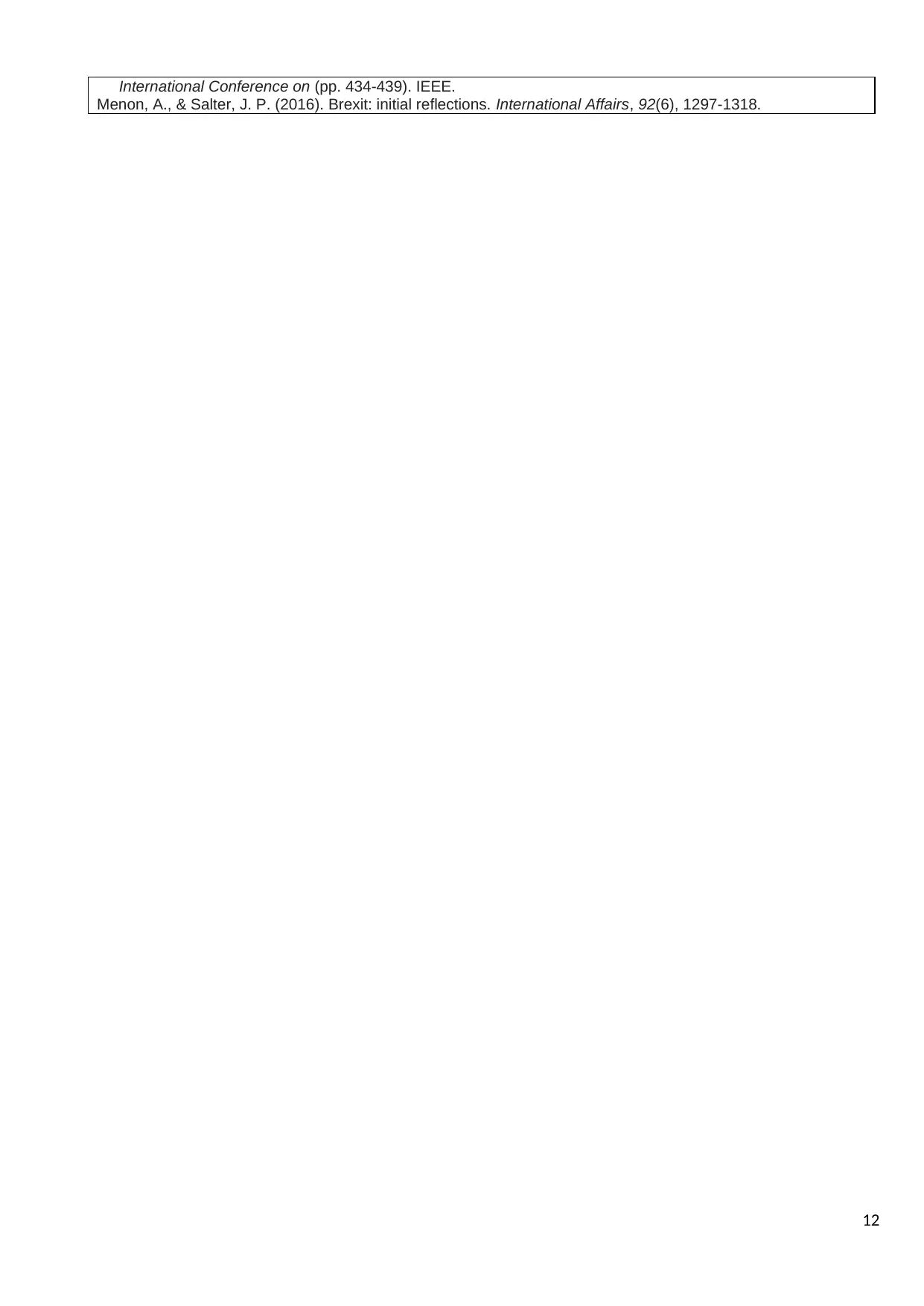
International Conference on (pp. 434-439). IEEE.
Menon, A., & Salter, J. P. (2016). Brexit: initial reflections. International Affairs, 92(6), 1297-1318.
12
Menon, A., & Salter, J. P. (2016). Brexit: initial reflections. International Affairs, 92(6), 1297-1318.
12
⊘ This is a preview!⊘
Do you want full access?
Subscribe today to unlock all pages.

Trusted by 1+ million students worldwide
1 out of 13
Related Documents
Your All-in-One AI-Powered Toolkit for Academic Success.
+13062052269
info@desklib.com
Available 24*7 on WhatsApp / Email
![[object Object]](/_next/static/media/star-bottom.7253800d.svg)
Unlock your academic potential
Copyright © 2020–2025 A2Z Services. All Rights Reserved. Developed and managed by ZUCOL.



